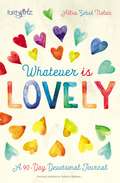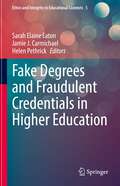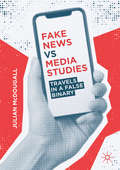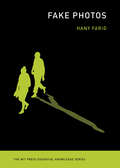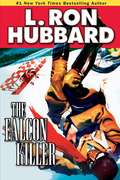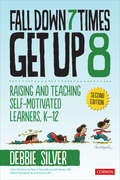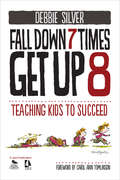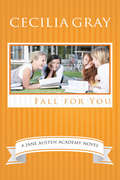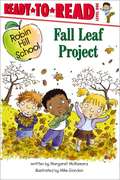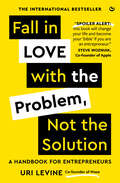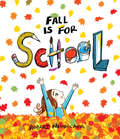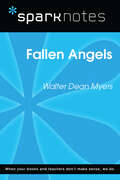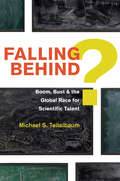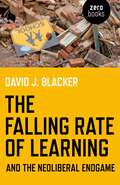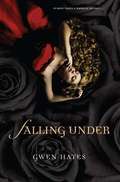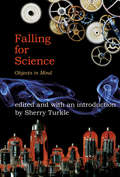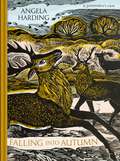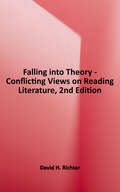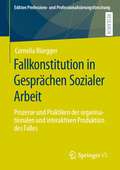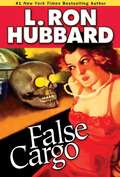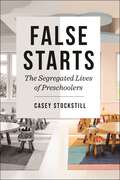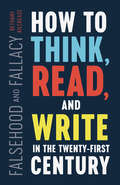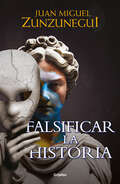- Table View
- List View
Faithgirlz! Whatever: Livin’ the True, Noble and Totally Excellent Life
by Allia Zobel Nolan“Whatever is true, whatever is noble, whatever is right, whatever is pure, whatever is lovely, whatever is admirable—if anything is excellent or praiseworthy—think about such things.” –Philippians 4:8 Did you know you can totally change your life by changing your thoughts? Well, you can, and WHATEVER can get you started. With examples based on girls just like you, each of these 90 devotionals will show you how to fill your head and your heart with virtues taken straight from Philippians 4:8 WHATEVER, helping you grow closer to God and the totally abundant life he intended for you. Take the “Whatever” challenge. When a friend says this word, reply by saying “Philippians 4:8.” And you’ll discover how you can live the 4:8, 24/7!
Fake Degrees and Fraudulent Credentials in Higher Education (Ethics and Integrity in Educational Contexts #5)
by Sarah Elaine Eaton Jamie J. Carmichael Helen PethrickThis book addresses an important topic in higher education: credential fraud. This includes, but is not limited to, fake degrees, diploma mills, admissions fraud, and cheating on standardized admissions tests. The book directly addresses fake and fraudulent credentials in higher education. It explores transcript tampering and fraud in varsity athletics and discusses lazy practices in the higher education hiring processes that open the door for professors without proper credentials to get jobs in post-secondary institutions. The book also discusses how technology is being used to stop the proliferation of fake and fraudulent credentials in a variety of ways, including blockchain technology.
Fake News vs Media Studies: Travels in a False Binary
by Julian McDougallThis book explores the place of Media Studies in the age of ‘fake news’, analysing the calls for a curriculum of critical news literacy as part of a cyclical policy debate. With the need for young people in democracies to understand mainstream news agendas and take a critical perspective on social media news, including so-called ‘fake news’, this book argues for Media Studies as a mandatory subject. However, ‘fake news’ is not presented in the book as a stable, neutral term with a clear definition, but is instead defined as an idea that risks obscuring the key critical and political premise of Media Studies. All media representation requires critical deconstruction: therefore, any distinction between ‘real’ and ‘fake’ media is a false binary. The author draws together two narrative strands: one analysing contemporary news and journalism, featuring interviews with journalists and news commentators, and the other re-appraising the discipline of Media Studies itself. This bold and innovative book will appeal to all those interested in the nebulous and often confusing media landscape, as well as students and practitioners of Media Studies.
Fake Photos (The MIT Press Essential Knowledge Series)
by Hany FaridA concise and accessible guide to techniques for detecting doctored and fake images in photographs and digital media. Stalin, Mao, Hitler, Mussolini, and other dictators routinely doctored photographs so that the images aligned with their messages. They erased people who were there, added people who were not, and manipulated backgrounds. They knew if they changed the visual record, they could change history. Once, altering images required hours in the darkroom; today, it can be done with a keyboard and mouse. Because photographs are so easily faked, fake photos are everywhere—supermarket tabloids, fashion magazines, political ads, and social media. How can we tell if an image is real or false? In this volume in the MIT Press Essential Knowledge series, Hany Farid offers a concise and accessible guide to techniques for detecting doctored and fake images in photographs and digital media. Farid, an expert in photo forensics, has spent two decades developing techniques for authenticating digital images. These techniques model the entire image-creation process in order to find the digital disruption introduced by manipulation of the image. Each section of the book describes a different technique for analyzing an image, beginning with those requiring minimal technical expertise and advancing to those at intermediate and higher levels. There are techniques for, among other things, reverse image searches, metadata analysis, finding image imperfections introduced by JPEG compression, image cloning, tracing pixel patterns, and detecting images that are computer generated. In each section, Farid describes the techniques, explains when they should be applied, and offers examples of image analysis.
Falcon Killer, The
by L. Ron HubbardEnjoy this gripping and gritty tale. China's war ace, a fighter pilot nicknamed "The Falcon Killer (Tzun Kai)," is actually Bill Gaylord, raised in Peking by his American parents. Gaylord lost both of them as a child during the violent Boxer uprising and then saw his foster family slaughtered in wartime. With a past that's hardened his soul and given him nerves of steel, Gaylord has used his resolve to down more Japanese aircraft than can be counted.When he's not hunting down enemy planes, intrigue constantly follows him--stars of Tzun's rogues gallery include an agent provocateur and a despotic Chinese warlord. Soon enough, events pit Gaylord against a Japanese spy who has caused untold trouble for the Chinese. Gaylord must somehow find and defeat him or risk losing an ancient Chinese kingdom to the land of the rising sun. "Hubbard writes with his usual gusto ('Wings in the sky had passed their shadows over the land to drop their acrid death'), and Gaylord is a typical Hubbard hero, tough and wily but also introspective and romantic." --Booklist
Fall Down 7 Times, Get Up 8: Raising and Teaching Self-Motivated Learners, K-12
by Debbie Thompson SilverFailure is just one step on the path to success. Failure is not only a possibility for learners during these challenging times, but a productive, concrete way of gaining ground. How can parents and educators teach kids to turn failure into progress toward success? This revised edition of the beloved bestseller, Fall Down Seven Times, Get Up Eight, has sensible answers, including both what to say and what not to say to truly help kids self-motivate and become independent, lifelong learners. Rich with fresh insights, this new edition offers a deeper understanding of how motivation works along with new, practical, research-driven strategies for spurring learners to thrive. It features: The latest research on motivation theory, persistence, self-regulation, grit, and a growth mindset in learners. An expanded focus on equity and culturally responsive approaches to ensure that all learners maximize their full potential. A new chapter on giftedness, an updated discussion guide, videos available via QR codes, and a robust companion website. Kids are bound to stumble and fall, but by capitalizing on knowledge and the latest research on motivation, we can equip them to stand up and move forward, pointing them on the route to success.
Fall Down 7 Times, Get Up 8: Raising and Teaching Self-Motivated Learners, K-12
by Debbie Thompson SilverFailure is just one step on the path to success. Failure is not only a possibility for learners during these challenging times, but a productive, concrete way of gaining ground. How can parents and educators teach kids to turn failure into progress toward success? This revised edition of the beloved bestseller, Fall Down Seven Times, Get Up Eight, has sensible answers, including both what to say and what not to say to truly help kids self-motivate and become independent, lifelong learners. Rich with fresh insights, this new edition offers a deeper understanding of how motivation works along with new, practical, research-driven strategies for spurring learners to thrive. It features: The latest research on motivation theory, persistence, self-regulation, grit, and a growth mindset in learners. An expanded focus on equity and culturally responsive approaches to ensure that all learners maximize their full potential. A new chapter on giftedness, an updated discussion guide, videos available via QR codes, and a robust companion website. Kids are bound to stumble and fall, but by capitalizing on knowledge and the latest research on motivation, we can equip them to stand up and move forward, pointing them on the route to success.
Fall Down 7 Times, Get Up 8: Teaching Kids to Succeed
by Debbie Thompson SilverA fresh approach to getting kids to work smarter and better, not just harder Award-winning teacher and best-selling author Debbie Silver addresses the relationship between student motivation and risking failure, calling failure a temporary “glitch” that provides valuable learning opportunities. She explains motivational theory, provides down-to-earth—often humorous—real life examples, and outlines concrete, applicable guidelines for helping students overcome setbacks and failure to foster lifelong success. Key topics include: How to help students become autonomous, enthusiastic, lifelong learners Why failure is not only an option, but a very concrete way of gaining ground The difference between a “pep talk” and specific, relevant feedback that enhances self-efficacy
Fall For You: The Jane Austen Academy (The Jane Austen Academy #1)
by Cecilia GrayLizzie knows Dante is a snob with a gift for pressing her buttons, and it's obvious to her that Dante thinks he's way too good for the Academy. But things are changing fast this year, and when Lizzie's quest to stop those changes blows up in her face, taking her oldest friendship with it, she has nowhere else to turn but to Dante, with his killer blue eyes, his crazy-sexy smile, and his secrets... Secrets Lizzie can't seem to leave alone, no matter how hard she tries...
Fall Leaf Project
by Margaret McnamaraThe first-graders of Robin Hill School love to look at all the different fall leaves. When they hear that in some states the leaves don't change color, they come up with a plan to share fall with other first-graders.
Fall in Love with the Problem, Not the Solution: A handbook for entrepreneurs
by Uri LevineThe founder of Waze and Moovit, and one of the world's most successful entrepreneurs, Uri Levine, gives you the ultimate practical guide to starting and running a business.Unicorns – companies that reach a valuation of more than $1 billion – are rare. Uri Levine has built two. And in Fall in Love with the Problem, Not the Solution, he shows you just how he did it.As the cofounder of Waze – the world's leading commuting and navigation app with more than 700 million users to date, and which Google acquired in 2013 for $1.15 billion – Levine is committed to spreading entrepreneurial thinking so that other founders, managers, and employees in the tech space can build their own highly valued companies. Levine offers an inside look at the creation and sale of Waze and his second unicorn, Moovit, revealing the formula that drove those companies to compete with industry veterans and giants alike. He offers tips on:Raising fundingFiring and hiringUnderstanding your usersMaking up-scale decisionsGoing globalDeciding when to sell Fall in Love with the Problem, Not the Solution offers mentorship in a book from one of the world's most successful entrepreneurs, and empowers you to build a successful business by identifying your consumers' biggest problems and disrupting the inefficient markets that currently serve them.
Fall is for School
by Robert NeubeckerFall is time for turning leaves,The weather's growing cool.Fall is here! Come on with me!It's time to go to school. In this exuberant sequel to Winter is for Snow, the two seasonally-opposed siblings face the end of summer with both joy and dread. But as Sister shares her enthusiasm for fall, school, and everything they encompass, Brother's own excitement grows in this celebratory picturebook. Robert Neubecker's expressive illustrations and buoyant rhymes will encourage even the most reluctant school-goers to embrace the start of a new season! Praise for Winter is for Snow* "Neubecker's snow-laden illustrations are crammed with activity while also revealing a certain emotional thawing." -Publishers Weekly, starred review"Neubecker's signature style and brightly colored illustrations are, as always, childcentered and detailed. A rhyming, rollicking salute to the coldest season." -Booklist
Fallen Angels (SparkNotes Literature Guide Series)
by SparkNotesFallen Angels (SparkNotes Literature Guide) by Walter Dean Myers Making the reading experience fun! Created by Harvard students for students everywhere, SparkNotes is a new breed of study guide: smarter, better, faster.Geared to what today's students need to know, SparkNotes provides:chapter-by-chapter analysis explanations of key themes, motifs, and symbols a review quiz and essay topics Lively and accessible, these guides are perfect for late-night studying and writing papers.
Falling Behind?: Boom, Bust, and the Global Race for Scientific Talent
by Michael S. TeitelbaumHow the fear of a shortage in American science talent fuels cycles in the technical labor marketIs the United States falling behind in the global race for scientific and engineering talent? Are U.S. employers facing shortages of the skilled workers that they need to compete in a globalized world? Such claims from some employers and educators have been widely embraced by mainstream media and political leaders, and have figured prominently in recent policy debates about education, federal expenditures, tax policy, and immigration. Falling Behind? offers careful examinations of the existing evidence and of its use by those involved in these debates.These concerns are by no means a recent phenomenon. Examining historical precedent, Michael Teitelbaum highlights five episodes of alarm about "falling behind" that go back nearly seventy years to the end of World War II. In each of these episodes the political system responded by rapidly expanding the supply of scientists and engineers, but only a few years later political enthusiasm or economic demand waned. Booms turned to busts, leaving many of those who had been encouraged to pursue science and engineering careers facing disheartening career prospects. Their experiences deterred younger and equally talented students from following in their footsteps—thereby sowing the seeds of the next cycle of alarm, boom, and bust.Falling Behind? examines these repeated cycles up to the present, shedding new light on the adequacy of the science and engineering workforce for the current and future needs of the United States.
Falling Rate of Learning and the Neoliberal Endgame
by David BlackerThe current neoliberal mutation of capitalism has evolved beyond the days when the wholesale exploitation of labor underwrote the world system's expansion. While "normal" business profits plummet and theft-by-finance rises, capitalism now shifts into a mode of elimination that targets most of us--along with our environment--as waste products awaiting managed disposal. The education system is caught in the throes of this eliminationism across a number of fronts: crushing student debt, impatience with student expression, the looting of vestigial public institutions and, finally, as coup de grace, an abandonment of the historic ideal of universal education. "Education reform" is powerless against eliminationism and is at best a mirage that diverts oppositional energies. The very idea of education activism becomes a comforting fiction. Educational institutions are strapped into the eliminationist project--the neoliberal endgame--in a way that admits no escape, even despite the heroic gestures of a few. The school systems that capitalism has built and directed over the last two centuries are fated to go down with the ship. It is rational therefore for educators to cultivate a certain pessimism. Should we despair? Why, yes, we should--but cheerfully, as confronting elimination, mortality, is after all our common fate. There is nothing and everything to do in order to prepare.
Falling Under
by Gwen HayesThough seclusive, when a devastatingly handsome boy appears in the halls of her school, Theia knows she's seen Haden before-- not around town, but in her dreams. As the Haden of both the night and the day beckons her closer one moment and pushes her away the next, the only thing Theia knows for sure is that the incredible pull she feels towards him is stronger than her fear. And when she discovers what Haden truly is, Theia's not sure if she wants to resist him, even if the cost is her soul.
Falling for Science: Objects in Mind
by Sherry TurklePassion for objects and love for science: scientists and students reflect on how objects fired their scientific imaginations."This is a book about science, technology, and love,” writes Sherry Turkle. In it, we learn how a love for science can start with a love for an object—a microscope, a modem, a mud pie, a pair of dice, a fishing rod. Objects fire imagination and set young people on a path to a career in science. In this collection, distinguished scientists, engineers, and designers as well as twenty-five years of MIT students describe how objects encountered in childhood became part of the fabric of their scientific selves. In two major essays that frame the collection, Turkle tells a story of inspiration and connection through objects that is often neglected in standard science education and in our preoccupation with the virtual. The senior scientists' essays trace the arc of a life: the gears of a toy car introduce the chain of cause and effect to artificial intelligence pioneer Seymour Papert; microscopes disclose the mystery of how things work to MIT President and neuroanatomist Susan Hockfield; architect Moshe Safdie describes how his boyhood fascination with steps, terraces, and the wax hexagons of beehives lead him to a life immersed in the complexities of design. The student essays tell stories that echo these narratives: plastic eggs in an Easter basket reveal the power of centripetal force; experiments with baking illuminate the geology of planets; LEGO bricks model worlds, carefully engineered and colonized. All of these voices—students and mentors—testify to the power of objects to awaken and inform young scientific minds. This is a truth that is simple, intuitive, and easily overlooked.
Falling into Autumn: part of a beautiful new series from beloved illustrator and print-maker Angela Harding
by Angela Harding'My encounters with nature are very personal. I am inspired by watching jays gathering acorns, owls hooting and the joy of hearing nightingales.''In the shady parts of my garden, ferns grow. In the springtime, the ferns unfurl their tight, rounded, bundled leaves into rich green fingers. By the autumn, these same leaves are starting to go brown at the edges. This seems to be at the same time that the swallows gather to leave. Groups of swallows sit in great flocks on the electric wires that are behind my studio. Together with the ferns, they are markers that the summer has gone; that one season has finished and another is about to begin.'Falling Into Autumn is the third book in a stunning seasonal quartet from beloved printmaker and illustrator Angela Harding. Each title in this pocket-sized series takes readers on a journey through the seasons, reflecting Angela's observations as the nature around her transforms and evolves over the course of a year. Taking in landscapes across the UK including views from her home studio in Rutland, to the Scottish wilderness, via the low-lying marshlands of Suffolk and the windswept hills of Yorkshire, the beautiful illustrations and evocative imagery of the prose make this the perfect book for nature lovers and art lovers everywhere.Featuring over thirty of Angela Harding's favourite prints alongside observations taken from her books A Year Unfolding, Wild Light and Still Waters & Wild Waves, each short, small book in this seasonal collection is a beautiful new way to enjoy Angela's work and celebrate nature and wildlife across the UK at all times of year.Collect all four titles: Spring Unfurled, Summer's Hum, Falling into Autumn, Winter's Song.
Falling into Autumn: part of a beautiful new series from beloved illustrator and print-maker Angela Harding
by Angela Harding'My encounters with nature are very personal. I am inspired by watching jays gathering acorns, owls hooting and the joy of hearing nightingales.''In the shady parts of my garden, ferns grow. In the springtime, the ferns unfurl their tight, rounded, bundled leaves into rich green fingers. By the autumn, these same leaves are starting to go brown at the edges. This seems to be at the same time that the swallows gather to leave. Groups of swallows sit in great flocks on the electric wires that are behind my studio. Together with the ferns, they are markers that the summer has gone; that one season has finished and another is about to begin.'Falling Into Autumn is the third book in a stunning seasonal quartet from beloved printmaker and illustrator Angela Harding. Each title in this pocket-sized series takes readers on a journey through the seasons, reflecting Angela's observations as the nature around her transforms and evolves over the course of a year. Taking in landscapes across the UK including views from her home studio in Rutland, to the Scottish wilderness, via the low-lying marshlands of Suffolk and the windswept hills of Yorkshire, the beautiful illustrations and evocative imagery of the prose make this the perfect book for nature lovers and art lovers everywhere.Featuring over thirty of Angela Harding's favourite prints alongside observations taken from her books A Year Unfolding, Wild Light and Still Waters & Wild Waves, each short, small book in this seasonal collection is a beautiful new way to enjoy Angela's work and celebrate nature and wildlife across the UK at all times of year.Collect all four titles: Spring Unfurled, Summer's Hum, Falling into Autumn, Winter's Song.
Falling into Theory: Conflicting Views on Reading Literature, 2nd Edition
by David H. RichterFalling into Theory is a brief and inexpensive collection of essays that asks literature students to think about the fundamental questions of literary studies today.
Fallkonstitution in Gesprächen Sozialer Arbeit: Prozesse und Praktiken der organisationalen und interaktiven Produktion des Falles (Edition Professions- und Professionalisierungsforschung #13)
by Cornelia RüeggerCornelia Rüegger analysiert, wie Sozialarbeitende im Ausgangspunkt der Fallarbeit ein Wissen darüber entwickeln, was den Fall und seine Problematik ausmacht und welcher Hilfe es bedarf. Auf der Basis von Gesprächsanalysen wird deutlich, wie in der Interaktion mit der Klientel das Wissen zum Fall hervorgebracht, relationiert und in Kategorien der Profession und der Organisation überführt wird. Dabei sticht die Selektivität bezüglich der verarbeiteten Informationen ebenso hervor wie die Bedeutung organisational vorgegebener Relevanzen. Zudem zeigen sich Taktiken der Gesprächsführung, um trotz des störungsanfälligen Redens über das Problem den Aufbau der Arbeitsbeziehung zu begünstigen.
False Cargo
by L. Ron HubbardDiscover intrigue. Brent Calloway is hired by an insurance firm to board a cargo vessel undercover and ensure it makes its way to San Diego in one piece. Once the voyage is underway, Calloway finds fraud, a pattern of organized scuttlings and the true fate of another vessel captained by an old friend. But when Calloway's true identity is revealed, he must fight for his life--and the real danger begins. ALSO INCLUDES THE ADVENTURE STORY "GROUNDED""...one of the great pulp writers, with colorful prose, lively action writing, exotic locales, fresh variations on standard characters and situations, and well-constructed plots."--Ellery Queen
False Starts: The Segregated Lives of Preschoolers (Critical Perspectives on Youth)
by Casey StockstillWinner, 2024 Bourdieu Best Book Award, given by the Sociology of Education Section of the American Sociological AssociationHonorable Mention, Outstanding Scholarly Contribution Award, given by the Children and Youth Section of the American Sociological AssociationAn inside look at the racial and class divides between Head Start and private pre-K classrooms for children and their familiesThe benefits of preschool have been part of our national conversation since the 1960s, when Head Start, a publicly funded preschool program for low-income children, began. In the past two decades, forty-four states have expanded access to preschool, often citing preschool as an anti-poverty policy. Yet, as Casey Stockstill shows, two-thirds of American preschools are segregated—concentrating primarily poor children of color or affluent white children in separate schools. Stockstill argues that, as a result, segregated preschools entrench rather than disrupt inequality.Stockstill spent two years observing children and teachers at two preschools in Madison, Wisconsin. Madison, like many other small and medium cities in the United States, is segregated, with affluent and middle-class white people and working class or low-income people of color occupying different sectors of the city. Stockstill observed one preschool that was 95% white and another that was 95% children of color. She shows that this segregation was more than a background variable or inconvenient image; segregation had an impact on children’s experiences in multiple ways, but especially in the ways they spent their time, the supervision and instruction they received, and the ways they learned and socialized with other children. Stockstill shows that even in high-quality preschools that on paper have similar resources, de facto segregation creates different school experiences for children that ultimately reinforce racial and class inequality.False Starts suggests that as we continue to invest in preschool as an anti-poverty policy, we need a fuller understanding of how segregated classroom environments impact children's educational outcomes and their ability to thrive.
Falsehood and Fallacy: How to Think, Read, and Write in the Twenty-First Century
by Bethany KilcreaseFalsehood and Fallacy shows students how to evaluate what they read in a digital age now that old institutional gatekeepers, such as the media or institutions of higher education, no longer hold a monopoly on disseminating knowledge. Short chapters cover the problems that exist as a result of the current flow of unmediated information, Fake News, and bad arguments, and demonstrate how to critically evaluate sources – particularly those that appear online. Kilcrease provides a range of tools to help students evaluate the legitimacy of what they read. She discusses how to be on the lookout for bad arguments and logical fallacies and explains how students can produce clear and convincing academic writing. Exercises are included throughout the book to test student knowledge. Written in a positive style and full of useful tools and exercises, Falsehood and Fallacy embraces the idea that everyone is a writer and has aptitude for further growth.
Falsificar la historia
by Juan Miguel ZunzuneguiNos gustan las mentiras. Tenemos la facultad de mentir, la capacidad de construir mentiras y la maravillosa inclinación de creer en ellas. Ese es el inicio y la premisa de Falsificar la historia. Un recorrido de miles de años por la historia, la filosofía y la religión; una aventura a través de la psicología individual y la de las masas, un viaje que no deja de moverse entre la realidad y los mitos, y que nos lleva a cuestionarnos TODO LO QUE HEMOS CREÍDO.Por medio de algunos de los acontecimientos más simbólicos de la historia universal, que comienzan con la creación y llegan hasta la caída de la Unión Soviética, Juan Miguel Zunzunegui nos lleva a las complejidades de la mente humana, a las herramientas que se han usado para someterla y al camino para finalmente descubrir la verdad.
